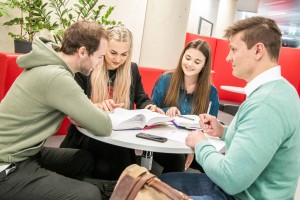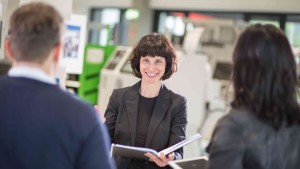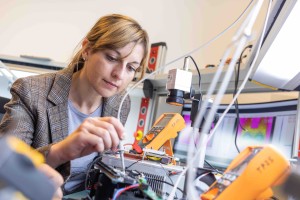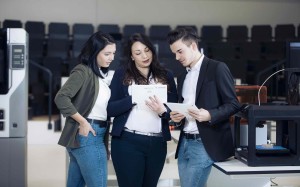Gerald Ferner and Michael Schütz are studying Electronics and Computer Engineering. Although they are already working towards their Master’s degrees, they continue to focus on the topic of their exceptional Bachelor’s theses. At the end of May 2018, they will be presenting their results at the NIWeek in Austin, Texas (USA).
National Instruments is a company which leads the world in the field of testing, measuring and control technology. In their Bachelor’s theses, Gerald Ferner and Michael Schütz addressed abstraction concepts in the field of semiconductor validation using the LabVIEW system development software from National Instruments. In May, they will be presenting their research in Austin, following on from Fürstenfeldbruck (Germany) and Vienna. They told us about their route to FH JOANNEUM, their exceptional Bachelor’s theses and their reasons for completing a Master’s degree.
The route to FH JOANNEUM
Gerald Ferner and Michael Schütz completed their Bachelor’s course in Electronics and Computer Engineering together, they were both awarded the first AT&S scholarship 2015 and joined forces for their final theses too.
However they both took very different routes to FH JOANNEUM: while Gerald Ferner started out on the Electronics course straight after completing his secondary education, with a short detour to the army and Graz University of Technology, Michael Schütz worked prior to his studies. After working for a big company for three years, he decided to begin studying in Graz.
“We gained a grounding in electronics during the Bachelor’s course. Some of the highlights included learning about LabVIEW and developing an automated coffee machine, circuit board design and designing various switches, for example, an amplifier switch for an ECG. The personal highlight of my Bachelor’s course was receiving the AT&S scholarship,” Gerald Ferner explains. For his mandatory internship during the sixth semester, like Michael Schütz, he applied to micro-electronics specialist NXP. Both were taken on and completed their Bachelor’s thesis there.
Off to Austin
“The sixth semester includes an internship as well as the Bachelor’s thesis and so the opportunity arose to combine the two. I wanted to tackle a topic where we could make use of the LabVIEW software from National Instruments. Our supervisor at the company, himself an extremely experienced LabVIEW user, suggested that we submit the projects to some user conferences. NIWeek in Austin is one of these and we received an invitation to attend,” says Michael Schütz.
However, the two were not willing to stop at a Bachelor’s, scholarship and successful presentations. And so they both decided to apply for the Master’s in Electronics and Computer Engineering at FH JOANNEUM Kapfenberg.
Michael Schütz’s reason for doing so: “The Bachelor’s degree provides a solid basis but the Master’s allows you to concentrate on a specific area of application”. Gerald Ferner adds: “Developing more in-depth knowledge in the fields of circuit design, controllers, programming, FPGA and microcontrollers is definitely useful in any subsequent job. Specialisation in the third semester is coordinated directly with industry and addresses the latest topics”. As part of the Master’s degree in Electronics and Computer Engineering, students choose to specialise in either Automotive Engineering or Power Electronics.









